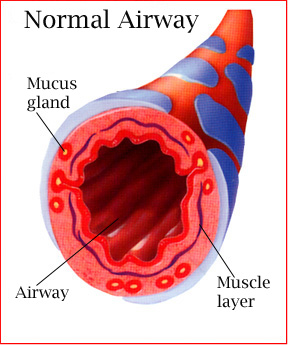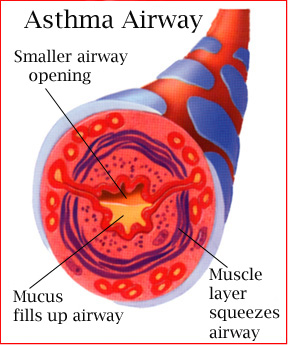When you have asthma, your airways are super sensitive, or "twitchy." They may react to many things. These things are called triggers.
In people who don't have asthma, exposure to such triggers
produces no real response in terms of breathing. But in people at risk for
asthma, the trigger causes your body's immune system to respond to the substance
as though it were a threat to your health. As a result, your immune system
cells set off a series of reactions in an attempt to "fight off" this
threat.
The reactions cause your airways to narrow and tighten. Extra mucus is also produced, which makes it even harder to breathe. The result is an asthma attack. Asthma Attack is a time of increased asthma symptoms.
 Asthma is a serious disease, and can kill if it is not treated the right way. But when it is treated the right way, people with asthma can live normal, active lives.
Asthma is a serious disease, and can kill if it is not treated the right way. But when it is treated the right way, people with asthma can live normal, active lives.
Facts on Asthma
Facts on Asthma
- Asthma is a chronic disease of the bronchial, the air passages leading to and from the lungs.
- Some 235 million people currently suffer from asthma. It is the most common chronic disease among children.
- Most asthma-related deaths occur in low- and lower-middle income countries.
- The strongest risk factors for developing asthma are inhaled substances and particles that may provoke allergic reactions or irritate the airways.
- Medication can control asthma. Avoiding asthma triggers can also reduce the severity of asthma.
- Appropriate management of asthma can enable people to enjoy a good quality of life.
- Asthma is a public health problem not just for high-income countries; it occurs in all countries regardless of the level of development. Most asthma-related deaths occur in low- and lower-middle income countries.
- Asthma is under-diagnosed and under-treated. It creates substantial burden to individuals and families and often restricts individuals’ activities for a lifetime.





Walang komento:
Mag-post ng isang Komento